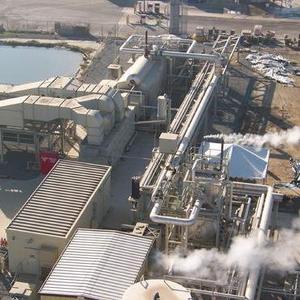CEC gives Pixley Biogas final grant approval

Calgren Renewable Fuels
March 14, 2014
BY Anna Simet
California-based Pixley Biogas has been given final approval for a $4.68 million dollar grant from the California Energy Commission.
Located in southwestern Tulare County, Calif., the anaerobic digester will take in dairy farm manure as substrate, according to project engineer Craig Hartman, who said the facility is “tied at the hip” with an adjacent ethanol plant, 58 MMgy Calgren Renewable Fuels Biorefinery, which it will supply all of its electrical output to.
The $10 million project is expected to produce 266 MMBtu of biogas daily, reducing Calgren’s natural gas consumption by 402 MMBTU per day, according to the CEC.
Advertisement
Advertisement
California Energy Quality Act requirements have been completed. Hartman said construction of the plant has already begun, and that completion is expected in September 2015.
Besides Pixley Biogas, the CEC also gave final approval for a $4.9 million grant to Encinitas, Calif.-based Community Fuels to expand biodiesel production capacity at its Port of Stockton facility from 10 MMgy to at least 15 MMgy, and a $1.6 million grant to convert older United Parcel Service and U.S. Postal Service medium-duty gas or diesel walk-in vans to use its electric power train.
Advertisement
Advertisement
Related Stories
The U.S. Department of Energy’s Office of Energy Efficiency and Renewable Energy is soliciting public comments on a preliminary plan for determining provisional emissions rates (PER) for the purposes of the 45Z clean fuel production credit.
On July 17, Iowa’s cost-share Renewable Fuels Infrastructure Program awarded $1.12 million in grants for 20 applicants to add B11 and 4 applicants to add E15 to retail sites. This was the first meeting following the start of RFIP’s fiscal year.
Par Pacific Holdings Inc., Mitsubishi Corp. and ENEOS Corp. on July 21 announced the signing of definitive agreements to establish Hawaii Renewables LLC, a joint venture to produce renewable fuels at Par Pacific’s refinery in Kapolei Hawaii.
A new study published by the ABFA finds that the U.S. EPA’s proposal to cut the RIN by 50% for fuels made from foreign feedstocks, as part of its 2026 and 2027 RVOs, could stall the growth of the biomass-based diesel (BBD) industry.
The European Commission on July 18 announced its investigation into biodiesel imports from China is now complete and did not confirm the existence of fraud. The commission will take action, however, to address some systemic weaknesses it identified.
Upcoming Events










